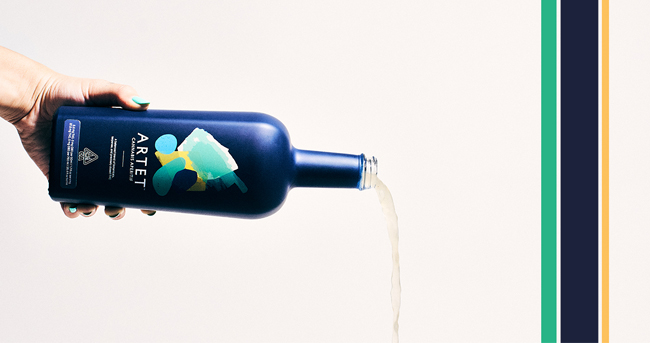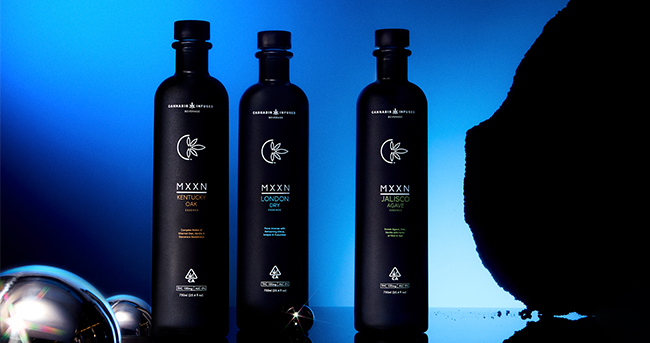For a new generation of cannabis drink brands, the message is buzz over booze.
Amidst the emerging class of players in the $426 million-and-growing THC-infused drink market, seltzers, sodas and shots remain the most prevalent product types, highlighted by names like CANN, Wunder and Mad Lilly. Those categories have enjoyed a lift from rising interest in the broader low-and-no-alcohol space overall, as consumers seek alternatives to alcohol. But rather than trying to pull consumers into a new format, a cohort of emerging brands are looking to make the transition from cocktails to cannabis as smooth as possible.
For an emerging brand like Artet, the goal is simple: capturing the elevated flavor profiles and sophisticated drinking experience of a classic, top-shelf aperitif, but with a different kind of buzz. The brand’s premium drinks are “cannabis products for cocktail moments,” according to Xander Shepherd, who co-founded the brand with his cousins Maxwell Spohler and Zachary Spohler in 2019. In developing Artet, the group tried to solve for the social gap between their positive experiences with cannabis and the social stigma around the plant, made particularly ironic in coming from “a boisterous, loud family that loves any excuse to get together over booze,” Shepherd noted.
“That dissonance between the lived experience of enjoying cannabis socially with friends and then going home and still having to sneak out after dinner was really a lot of the initial spark that got us thinking,” he said. “If we could recontextualize cannabis and put it in a format that’s familiar, comfortable, consistent and delicious, then we could start to play a role in this impending cultural shift that was very obvious in terms of the mainstreaming of cannabis and exist in places and spaces that a joint traditionally hadn’t been able to.”
Similar to what brands like Ritual Zero Proof and Seedlip have done with their non-alcoholic spirits-alternatives, Artet’s presentation takes its cues from premium liquor, with an elegant 750ml bottle designed for behind the bar. Within that context, it works intuitively as an aperitif — “beverages that are low-proof, that supposed to open your mind, your mood, your palette,” as Shepherd described — enjoyed on its own or as the base for Artet’s RTD cocktail line, available in Rosemary Jane, Tet & Tonic and, most recently, Mango Ginger Spritz. Each contains 5mg THC and 5mg CBD, 35 calories and no added sugars.
Even in showcasing the quality of its hero ingredient, Artet is leaning more into flavor than function. The label’s seasonal Founder’s Blend No. 1 is billed as a collaboration with California-based grower Aster Farms, which provides a single strain (Honeydew Funk) live resin, a process in which fresh-picked cannabis flower is immediately frozen to preserve its unique terpene and flavor profile. The indica dominant hybrid strain provides “a uniquely euphoric effect,” but also features “piney tasting notes” that work in harmony with the fruity, earthy and sour flavors.
“We need to think holistically about the flavor profile, about the quality of the ingredients we use, about all of these things that we as consumers ourselves care about and work through that lens of creating a beverage that puts cannabis front and center but still thinks holistically,” said Shepherd. “What we hear from people is that they appreciate the actual flavor profile of what we’ve created. And now it goes back into this idea of how it’s not simply about drinking to get high. It’s about drinking to enjoy a quality beverage with integrity.”
Meanwhile, Darnell Smith’s experience as a marketing consultant for Diageo helped directly inspire the launch of his cannabis-infused zero-proof spirits line, called MXXN, earlier this year. Exhausted from the level of alcohol consumption attached to his professional responsibilities, he began making a cannabis tincture for personal use during drinking occasions. When he was offered the opportunity to join the founding team at a new non-alcoholic spirit startup, the idea of using that liquid as a vehicle for cannabis appeared a natural fit.
The resulting line is a true marriage of the two spaces: available in three flavors — Kentucky Oak, Jalisco Agave and London Dry — MXXN is designed as a 1:1 replacement for bourbon, tequila or gin, with around 6mg THC per 1.5 oz serving.
“For me, it was very important for this to be very close to home for something that was very widespread, so it wasn’t asking for huge behavioral change,” said Smith. “If you see that bottle of gin, you can move it to the side and you can use our London Dry in any way that you use that gin; same with the tequila, same with the bourbon. And that was for me kind of the ‘aha’ moment as I looked across the spectrum of what’s happening. That was what was missing — it was first me filling my own needs, and it happened to be a need that is resonating with quite a lot of people.”
Artet and MXXN are just two names in a rapidly expanding space, as mixologists, spirits experts and master distillers have found a welcome home within the burgeoning cannabis market. Notable names include Los Angeles-based label AMASS — which offers both alcoholic and non-alcoholic spirits, and recently introduced a cannabis-infused zero-proof expression — and Klaus, the RTD concept from acclaimed craft cocktail maker Warren Bobrow. And that’s just the independents: beverage alcohol giants Constellation Brands, Pabst Blue Ribbon and Molson Coors have already made their interest in playing within cannabis drinks clear.
In hewing close to alcohol, however, cannabis beverage makers are taking a calculated risk. According to a study from research firm IWSR, one-third of adults who purchased non-alcoholic drinks did so because they enjoy the taste, suggesting that consumers may be looking for other kinds of flavor experiences. Within infused beverages, recognizable formats like sparkling waters and flavored CSDs are more prevalent than spirits-like drinks like Artet and MXXN, which cost more and turn less frequently than single-serving products. Consumer experience may also vary: new users will need to seek out products at dispensaries or authorized online outlets, while experienced ones looking for higher potency may also be disappointed.
Yet, the synergies, particularly with younger consumers, are apparent: according to data from Brightfield Group, relative to Baby Boomers, Millennials are 38% more likely to drink alcohol at an after work gathering, but 88% more likely to drink cannabis. When the occasion changes to a bar or nightclub, the two groups use alcohol at similar rates, but Millennials are more than twice as likely to use cannabis in the same setting. Those on-premise channels are still mostly restricted for THC beverages, but notably both Millennials and Baby Boomers are equally comfortable using cannabis and drinking alcohol in the privacy of their homes, meaning there’s opportunity for cannabis drink makers to find ways to fit their innovations into existing consumer behaviors.
Bethany Gomez, managing director at Brightfield, noted that the trend towards spirits-adjacent cannabis drinks aligns with the broader low-and-no-alcohol movement. In a recent survey, the group found that over half of American consumers surveyed are looking to reduce their alcohol consumption, and 44% are looking for more non-alcoholic alternatives. Of those that are drinking less, 22% report swapping alcohol for cannabis, far outpacing the likes of sparkling water (19%), CBD beverages (10.4%) and non-alcoholic beer (8.9%)
“It’s only natural that we would see a wave of cannabis products specifically positioned as alcohol alternatives,” Gomez noted.
That means education and engagement are critical for brands like Artet and MXXN, the latter of which is preparing to roll out a 100ml bottle to drive trial. The alignment with spirits extends to retail: MXXN launched direct-to-consumer shipping in adult-use markets in January in order to “make the experience analogous to how many people are ordering spirits today through Drizly” and other digital platforms.
“A lot of our consumers, funnily enough, have never even stepped foot in a dispensary,” Smith said. “So this is really an entry point for them to the space and for us, we’re banking on being able to bring a new consumer to retail dispensaries, and they’re really understanding that.”



